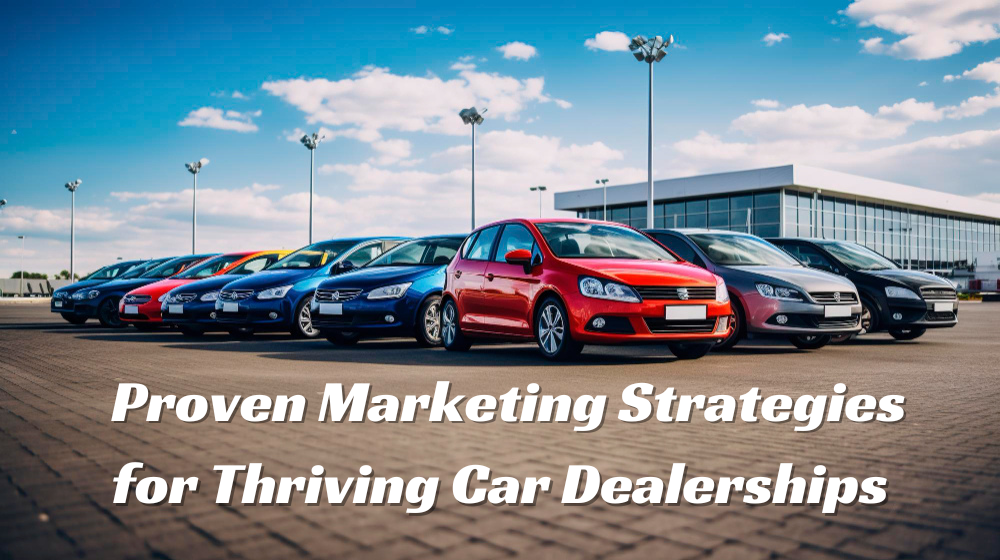In the fiercely competitive automotive industry, car dealerships constantly seek innovative ways to boost revenue and maintain a competitive edge. This comprehensive article delves into proven marketing strategies that empower car dealerships to drive revenue growth and thrive in the marketplace.
Building a Strong Brand Presence
A clear and compelling brand identity is essential for car dealerships to stand out in a crowded marketplace. By articulating unique value propositions and communicating their brand story effectively, dealerships can build customer trust and loyalty.
Consistent Brand Messaging
Consistency in brand messaging across various marketing channels reinforces brand recognition and strengthens customer perceptions. Whether through advertising campaigns, social media content, or in-person interactions, maintaining a cohesive brand voice enhances brand recall and fosters customer engagement.
Leveraging Digital Marketing Channels
In today’s digital age, car dealerships must have a solid online presence to reach and engage potential customers. Digital marketing offers various avenues for connecting with prospects and nurturing them through the sales funnel.
Search Engine Optimization (SEO)
Optimizing website content for search engines is crucial for driving organic traffic and improving online visibility. By incorporating relevant keywords, creating quality content, and implementing other SEO best practices, dealerships can increase their website’s ranking on search engine results pages and attract more potential customers.
Website Optimization
A well-designed and user-friendly website serves as a digital storefront for car dealerships. It provides customers with essential information and facilitates seamless browsing experiences. By optimizing website functionality and implementing search engine optimization (SEO) strategies, dealerships can improve their online visibility and drive traffic to their site.
Implementing Targeted Marketing Campaigns
Car dealerships must tailor their messaging and tactics to specific target audiences to maximize the impact of marketing efforts and drive revenue. By understanding customer demographics, preferences, and behaviour, dealerships can develop targeted campaigns that resonate with their ideal customers.
Target Audience Segmentation
Segmenting the target audience based on demographics, psychographics, and buying behaviour enables car dealerships to tailor marketing campaigns to specific customer segments. By understanding different customer groups’ unique needs and preferences, dealerships can deliver targeted messaging that resonates with their audience.
Personalized Marketing Communications
Implementing personalized marketing communications strategies enhances customer engagement and drives conversions. Dealerships can leverage customer data and insights to deliver relevant messaging across various marketing channels, fostering stronger connections and driving customer loyalty.
Embracing Innovative Technologies
The automotive industry constantly evolves, with technological advancements transforming the car buying and ownership experience. By embracing innovative technologies, car dealerships can differentiate themselves from competitors and enhance the customer journey.
Virtual Showrooms and Test Drives
Leveraging virtual reality (VR) and augmented reality (AR) technologies allows car dealerships to provide immersive showroom experiences and virtual test drives. By enabling customers to explore vehicles from the comfort of their homes, dealerships enhance engagement and facilitate informed purchase decisions.
Data Analytics and Customer Insights
Harnessing data analytics tools and customer relationship management (CRM) systems empower car dealerships to gain actionable insights into customer behaviour and preferences. By analyzing customer data, dealerships can identify trends, predict future buying patterns, and optimize marketing strategies for maximum impact.
Enhancing Customer Experience
Providing exceptional customer experience is crucial for car dealerships to build long-term relationships and secure repeat business. By continuously striving to improve the customer journey, dealerships can foster brand loyalty and drive revenue growth.
Streamlined Purchase Processes
Transparent pricing, online financing options, and streamlined processes simplify car-buying, enhancing customer satisfaction and driving loyalty. Dealerships create frictionless experiences that delight customers and encourage repeat business by seamlessly integrating online and offline.
Exceptional Customer Service
Prioritizing exceptional customer service at every touchpoint builds trust and loyalty among customers. By investing in training programs and resources, dealerships empower staff to deliver personalized service and exceed customer expectations, fostering long-term relationships and positive word-of-mouth referrals.
Measuring and Analyzing Marketing Performance
Identifying relevant KPIs allows car dealerships to measure the effectiveness of their marketing efforts and track progress toward revenue goals. Metrics such as website traffic, lead generation, conversion rates, and customer satisfaction provide valuable insights into marketing performance and inform strategic decision-making.
Implementing robust tracking and analytics systems enables car dealerships to monitor real-time marketing performance and identify improvement areas. By analyzing performance data and iterating on marketing strategies, dealerships can optimize campaigns for maximum ROI and drive sustainable revenue growth.
Cultivating Strategic Partnerships
Collaborating with strategic partners can help car dealerships expand their reach, access new markets, and enhance brand credibility. By cultivating relationships with complementary businesses and organizations, dealerships can reach new customer bases and strengthen their reputation as trusted automotive providers.
Manufacturer Relationships
Strong partnerships with automotive manufacturers provide access to exclusive inventory, promotional opportunities, and cooperative marketing initiatives. By collaborating closely with manufacturers, dealerships can align brand messaging and leverage co-marketing efforts to amplify their reach and drive revenue.
Local Community Engagement
Active participation in local community events, sponsorships, and charitable initiatives fosters goodwill and strengthens ties with the community. By building meaningful relationships with residents and organizations, dealerships enhance brand visibility and reputation, driving positive brand associations and customer loyalty.
Conclusion
In conclusion, by implementing these proven marketing strategies, car dealerships can drive revenue growth, differentiate themselves in the marketplace, and thrive in the competitive automotive industry. With a strategic focus on building brand presence, leveraging digital channels, delivering exceptional customer experiences, and measuring performance, dealerships can achieve sustained success and position themselves as industry leaders in automotive lead generation and sales.
